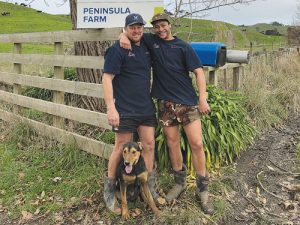Peninsula Farm is where herd improvement company CRV Ambreed grazes its young Friesian, Jersey and crossbred bulls that may become the industry’s next megastars.
Each year 150 bull calves are selected for CRV Ambreed’s progeny test programme and are shipped from farms NZ-wide to the company’s Bellevue production and logistics centre.
At about 12 months of age their semen is harvested and then allocated and distributed to contracted progeny testing herds nationwide.
It takes four years to measure the performance, milk production and type of a bull’s daughters, so for the next 3.5 years these bulls graze in an isolated and controlled environment at Peninsula Farm.
250 Friesian, Jersey and crossbred bulls averaging 800kg graze at the farm over winter and up to 310 bulls in spring. They are put into mobs of 10-20 bulls, and each mob is rotated around three or four paddocks. Annually, 800 silage bales are brought in and fed out from March to October.
Farm manager Darryl Parker says Peninsula Farm is paradise seven months of the year and wet and windy the rest. Big areas of the farm are planted in native trees and shrubs to protect from coastal erosion.
With large animals up to 1000kg walking around in winter the paddocks can quickly become soft, Parker says.
“We spend a lot of time rolling, levelling and re-growing grass where we can,” he says. “As you’d expect with a bull farm, there’s also triple the maintenance of your typical dairy farm, but that is part and parcel of what we do.”
The 240ha farm suits quarantine as the farm’s boundary has only 800m of neighbouring farm. Three sides have a coastal boundary and the fourth side that neighbours another property is seperated by a gravel road. All sides are double-fenced with a 5m buffer zone, which protects the coastline and prevents nose-to-nose contact with other stock.
All precautions possible protect the quarantine disease status of the bulls and manage any known biosecurity risk, including diseases such as IBR, BVD and Mycoplasma bovis.
The farm is categorised as a fully isolated controlled environment, managed under strict vet supervision. It’s also registered and audited bi-annually by the Ministry for Primary Industries.
“We follow strict biosecurity practices in hygiene and equipment disinfection,” Parker says.
“We minimise visitors, but when we do have visitors they have to sign in and out, and their vehicles and any other equipment are sprayed and washed if they have to come onfarm.”
Health and safety is always top of mind for Parker and farm assistant Jordan Ratima.
“I’ve been working for CRV Ambreed for over 20 years and been on this farm for almost five years, but I am still wary at all times. It’s all about keeping your eyes open, keeping your distance and getting to know the bulls,” he says.
“98% of the animals are fine to handle, but for safety we always have two people on hand to shift and feed the bulls.
“We don’t walk through paddocks; we’re always on bikes. We use dogs. And feed is important; we usually use feed to shift the animals when they need to be shifted,” he says.
After the four-year progeny test, the bulls with the potential to provide the highest genetic gain for dairy farmers are selected by CRV Ambreed’s product management and product development team, which includes Parker’s older brother Aaron.
They have a combined 46 year history with the company.
These bulls are once again health tested and put into interim quarantine on Peninsula Farm for 45 days.
Once their blood and TB tests come back clear, they return to the CRV centre near Cambridge for more quarantine disease testing.
Final journey
The final stage of the bulls’ journey is to enter the semen collection centre; here their semen is collected for freezing for AI for CRV customers worldwide.
Each season the next group of bulls in waiting make their way to Peninsula Farm.
“Seeing the top bulls go off to collection every year and knowing that I was part of that is really satisfying,” Parker says.
“I love working at the farm and I don’t get bored out here.
“There’s the normal farm chores like stock work, repairs and maintenance and farm development, but then I get to blood bulls, take bull photos and collect semen from a 1000kg bull.
“And at the end of the working day I can drop a net for a feed of flounder or go whitebaiting, so it’s a real privilege to live out here.”









